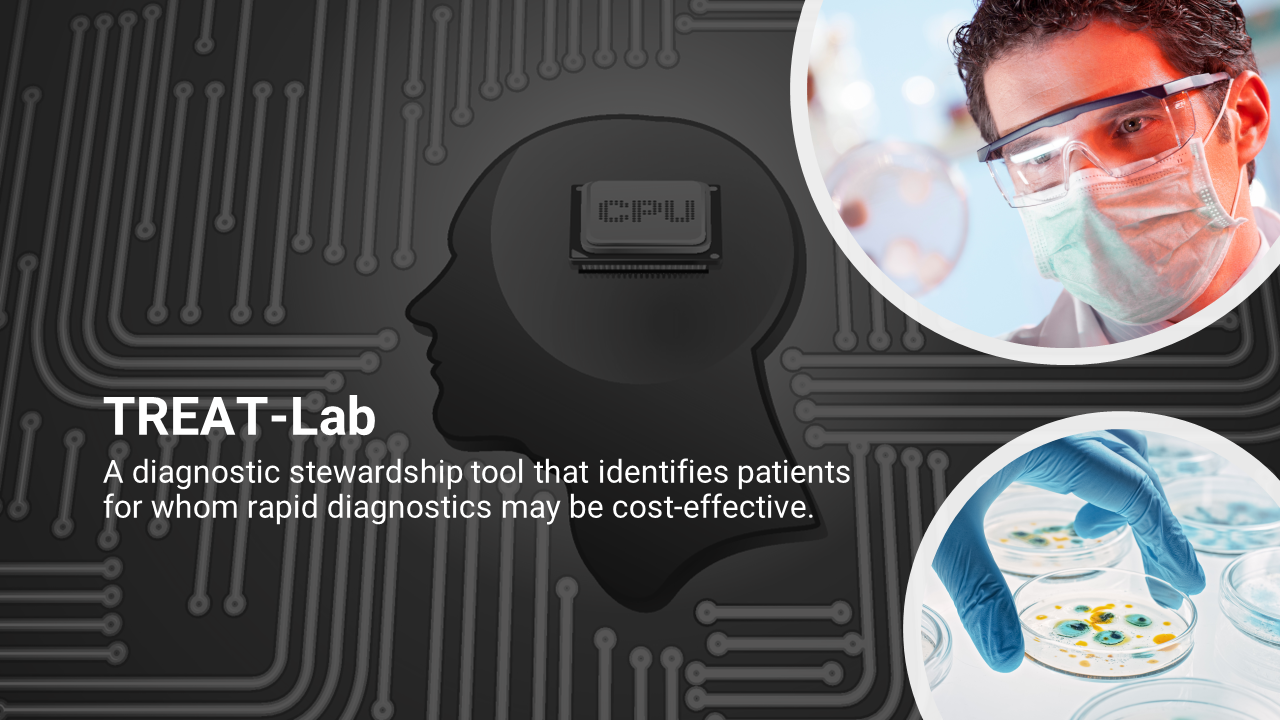TREAT Software Suite
Clinical decision support system for personalized antibiotic therapy and other stewardship functions. The system is CE-marked, has been tested on over 10,000 patients, and integrates in real-time into the hospital’s existing infrastructure.
Developed and validated in real-world hospital settings
Developed in close collaboration with hospital end-users, TREAT fits seamlessly into existing workflows
Increase Guideline Compliance
TREAT turns static guidelines into personalized recommendations — in just two clicks to boost compliance and streamline clinical decision-making.
Improving initial antibiotic choices
TREAT improves initial antibiotic choices in acute care, and have shown to deliver up to 15% higher coverage for patients treated before microbiology results are available.*
Reduce broad-spectrum use
TREAT reduces reliance on broad-spectrum antibiotics from the WHO Watch & Reserve lists — and promotes the use of Access drugs. *
Transparant and safe decision support
Trust begins with understanding. TREAT reveals the rationale behind every recommendation — making clinical it both transparent and teachable.
Pays for itself within months
TREAT yields a 261% return on investment within the first year - through fewer bed-days, lower drug costs, and fewer readmissions.
Easy integration to excisting IT-structures
TREAT integrates easily into most existing hospital IT infrastructures. It complements – not replaces – your current systems and clinical tools.
Our solutions
We are dedicated to build integrated solutions that fulfill our customers’ needs whether they are looking for surveillance, bed-side guidance or resource management in the clinical or laboratory settings. All our solutions are developed with the highest quality under our management systems using the ISO13485, ISO27001 and ISO27701 standards.

TREAT-Essential
A fully integrated antimicrobial stewardship tool helping clinicians to select rational antimicrobial therapy at point of care.
TREAT-Essential is a comprehensive software tool for implementing an Antimicrobial Stewardship Program. It automatically collects data, provide patient-specific advice of treatment adapted to local policies, and manage reports and statistics as well as antibiograms. It gives the opportunity to create consistency and assure quality in the management of patients with infection and the use of antimicrobials. TREAT-Essential consists of a set of modules grouped according to three main areas of focus: Quality assurance, Decision support, and Statistics and surveillance.
TREAT-Lab
A diagnostic stewardship tool that identifies patients for whom rapid diagnostics may be cost-effective.
TREAT-Lab is a tool for the clinical microbiologist; supporting diagnostic- and antimicrobial stewardship initiatives in the microbiology laboratory. The core of TREAT-Lab is its proprietary risk-prediction algorithm: a model that estimates the risk of death and the likelihood of a positive microbiological test. The risk-prediction algorithm uses a Causal Probabilistic Network (CPN) model of the patient’s inflammatory response and can be used as guidance of when to take additional rapid tests in a cost-effective way.

Key Publications
Improving empirical antibiotic treatment using TREAT, a computerized decision support system: cluster randomized trial
M Paul, S Andreassen, E Tacconelli, AD Nielsen, N Almanasreh, U Frank, R Cauda, L Leibovici on behalf of the TREAT Study Group
DOI: 10.1093/jac/dkl372
Performance of the TREAT decision support system in an environment with a low prevalence of resistance pathogens
K Kofoed, A Zalounina, O Andersen, G Lisby, M Paul, L Leibovici, S Andreassen
DOI: 10.1093/jac/dkn504
Evaluation of the decision support system for antimicrobial treatment, TREAT, in an acute medical ward of a university hospital
B Arboe, RR Laub, G Kronborg, JD Knudsen
Clinical- vs. model-based selection of patients suspected of sepsis for direct-from-blood rapid diagnostics in the emergency department: a retrospective study
L Ward, S Andreassen, J Astrup, Z Rahmani, M Fantini, V Sambri
A comparison of predictors for mortality and bacteraemia in patients suspected of infection
S Andreassen, JK Møller, N Eliakim-Raz, G Lisby, L Ward
Predicting sepsis onset using a machine learned causal probabilistic network algorithm based on electronic health records data
John Karlsson Valik, Logan Ward, Hideyuki Tanushi, Anders F Johansson, Anna Färnert, Mads Lause Mogensen, Brian W Pickering, Vitaly Herasevich, Hercules Dalianis, Aron Henriksson, Pontus Nauclér
DOI: 10.1038/s41598-023-38858-4


